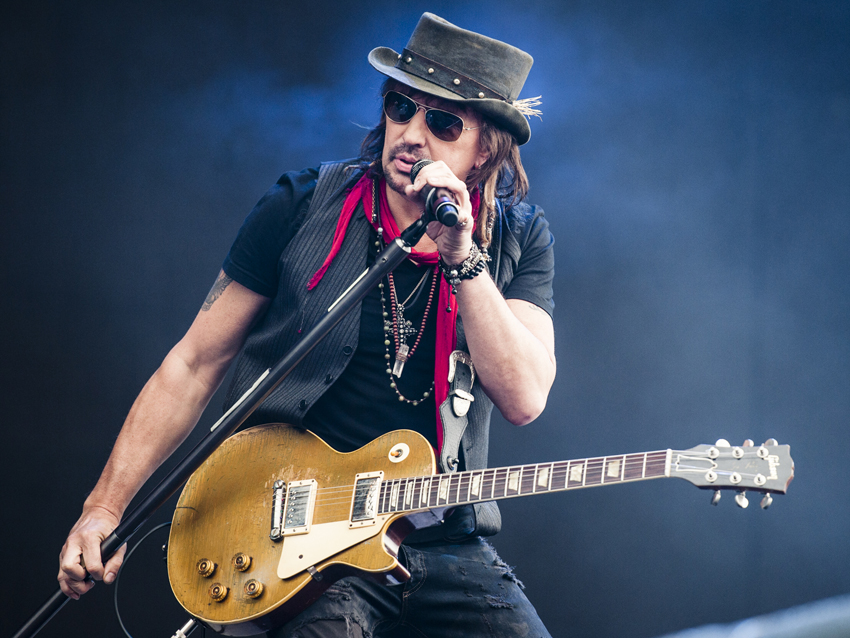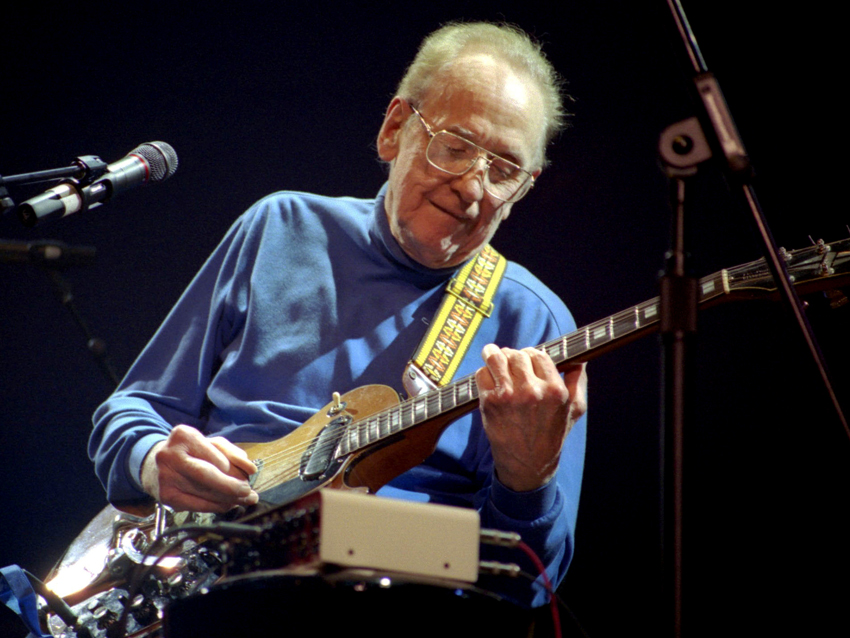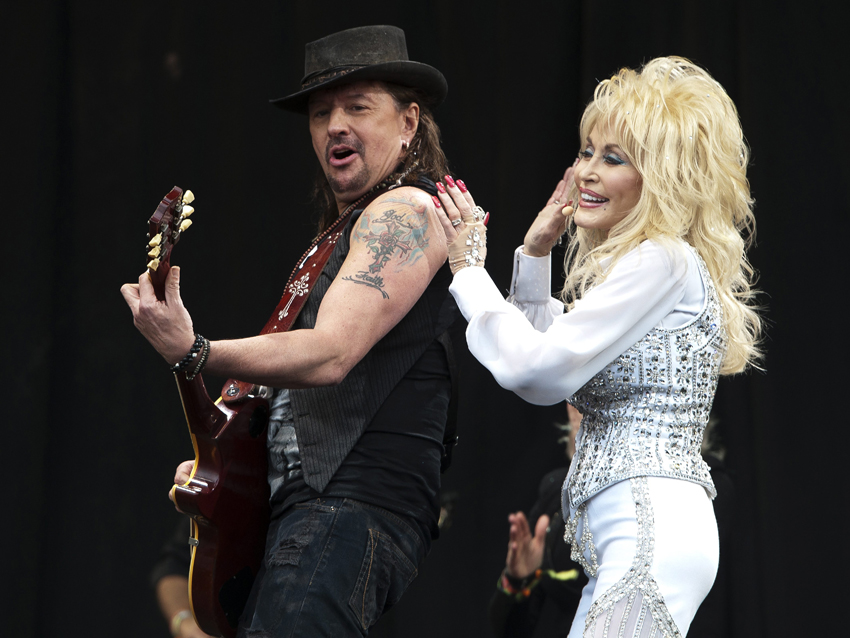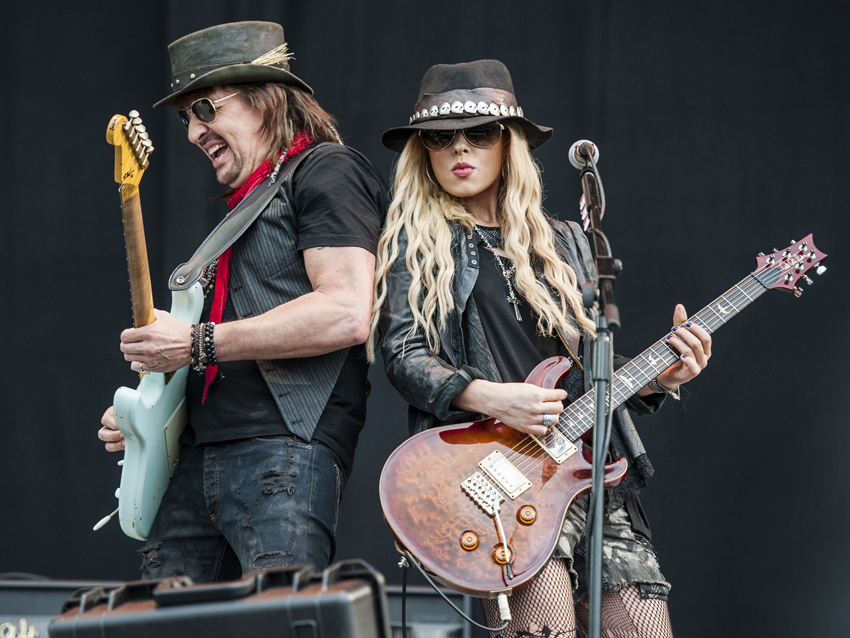
Richie Sambora talks about his upcoming Les Paul tribute shows
Richie Sambora has played all kinds of gigs over the course of his 30-year career, and since the release of Bon Jovi's 25-million-copy-selling album Slippery When Wet, in 1986, most of those shows have been of the sold-out arena and stadium variety.
But the three shows that Sambora will perform at the 170-seat Iridium in New York City, on July 22 and 23, in honor of his late friend, guitar pioneer Les Paul, just might eclipse anything he's ever done before in terms of sentiment. The gigs will raise funds for the Les Paul Foundation, and for fans who aren't able to make the trip into Manhattan, they'll still get a chance to see them on Public Television's Front And Center this fall.
“To say I'm looking forward to these shows is a huge understatement," Sambora says. "Les was truly a great friend to me; the arc of our relationship was pretty deep. We shared so many experiences and talked about... you name it, anything and everything. I’m just so blessed to have known him and to have had so many beautiful times with him."
Sambora sat down with MusicRadar to talk about the great Les Paul and the upcoming Iridium performances, along with some of his recent activities which include playing alongside Dolly Parton and Stevie Wonder, as well as his newfound partnership with Australian guitar virtuoso Orianthi.
Tell me how you met Les Paul.
“When I met Les... It was back when I was working on the New Jersey album, which was supposed to be a double record – not an easy thing to do, let me tell you. When you’re trying to make a double album and you’re a guitar player, a writer, an arranger and a singer, you’re doing all of this stuff, wearing many hats. The whole thing can really wear on you.
“At one point, I was starting to think that the record wouldn’t get done. So I said to my manager, ‘I’m starting to feel overwhelmed. I’ve gotta go home. I’m going to see my mom and dad. I’ve just gotta chill out.’ We were cutting 25 songs, which meant that I had to do five guitar parts on each one, play solos on each one, and sing on them and everything else – the whole bit.
“I felt as though nobody was backing me up. So I was talking with Dennis Berardi of Kramer Guitars about it. Dennis is dear friend of mine – Kramer was the first guitar company I ever worked with as an endorser. He understood where I was coming from.
“So I went home and had a small birthday party, maybe 30 people or so. Suddenly, Dennis walks in with Les Paul. I was like, ‘Really?... You’re kiddin’ me!’ I mean, when does happen in life, ever?’ I grabbed Les, and he and I went out to the dock. I told my assistant, ‘Nobody gets past this point until I’m done.’ Les and I stayed on the dock talking for, like, two hours. It was the best. If we had grown up together, we would’ve been friends. Which is a weird thing when you think about it, him being the father of the electric guitar and the inventor of multi-track recording. Somehow, I was able to distinguish that line – ‘There’s the legend and there’s the man.’
“He said to me that night, ‘Here, I brought you something.’ And he hands me this white Les Paul. I was just struck – ‘You’re kidding.’ He said to me, ‘Yeah, I’ve been listening to what you’re doing. I get what’s going on.’ I couldn’t believe it. And then he said, and this is the quote, ‘Son, here’s the sword. Go cut the shit.’
“It was such a pivotal moment, especially for where I was at in that place in time. It was like an angel came down from heaven and tapped me on the shoulder, like, ‘OK, here you go. Keep going, man.’ Him giving me that guitar was like giving me the sword that saved me.”

On Les Paul
You played with Les many times during the rest of his lifetime. Do you have a favorite memory of jamming with him?
“Oh, man… Look, whenever you play with Les Paul, it’s an honor. I’ll tell you a story: He asked me to induct him into the Songwriters Hall Of Fame – of course, I said yes. I’m at the event, and my good friend Phil Ramone was leading the orchestra. I came out and did a couple of songs, and then it was time for me to give a speech. Les is in the front row watching me as I’m talking. Halfway through, he comes up and tells everybody, ‘Enough of this frivolity.’ I guess I was praising him too much.
“He starts talking – ‘You know, I’m widely known for my song with Mary Ford, How High The Moon, but my favorite song was on the B-side.' And people are wondering, 'Yeah, what was that?' And he said, 'It was called I Would Tell You I Love You, But You’re Sitting On My Face.' [Laughs] Coming from a guy of his age, it just laid everybody out. We were pissing ourselves, crying laughing. But that’s the kind of guy he was; he was a really funny, funny guy.
“Later on that night, we were jamming on some blues. I looked over at him and noticed that he was sort of falling off his stool. So I went over and hooked him underneath the armpit, you know, to kind of lift him up. At the same time, my cat Chris Thompson came up on the other side, and we both helped Les back up onto his chair. Les looked at us and said, ‘Oh, I do that a lot lately.’ And he just kept on jamming. There were funny moments like that.”
What can we expect you to play at the Iridium shows?
“I’m trying to figure that out right now. It’s as much a story as it is a show; it’ll cover the arc of our relationship. The last song that I ever played with him was a song I wrote called Great Hall Of Fame, which was on the tribute record [Les Paul & Friends – A Tribute To A Legend, 2008]. That was the last time I saw him. I know I’ve gotta play that one. And Somewhere Over The Rainbow – I’ve gotta do that, too. That’s gonna make me cry.
“I want people to feel him, though, not me. I hope people know that know that not only was he a great man, but he was a kind man, too – funny, warm, caring. He shared a lot.
“You know, you sit there and you go, ‘What means things to you in your life?’ And for me, of course, there’s my daughter and my mother and my family and friends, all the people who are dear to me. But what’s the fabric? There’s another fabric there and it’s called the guitar. It’s held me together all of these years. And who was the father of the electric guitar? That was Les Paul."

On Dolly Parton
These shows come after a pretty busy period for you. You toured with Orianthi, played with a bunch of people at festivals…
“I’ll tell you, I had a day off, and Dolly Parton called me and said that she wanted me to play the Glastonbury Festival with her. I said, ‘Yeah!’ It was 300,000 people or more, like Woodstock or something – a cultural event. She recorded one of my songs, Lay Your Hands On Me, and she’s been playing it live. She wanted to do it with me. So we did it, and we blew the place up. She’s the best.”
What do you think of the way she’s interpreting the song, turning it into more of a gospel number?
“Look, man, that’s the way I envisioned it. If you listen to that song New Jersey, what does it start with? A gospel organ. I came up with it towards the end of the making of that record. I thought we needed something that was guitar driven and heavy. Obviously, when you’re working with somebody else, there’s a compromise, so I said, ‘OK, Jon, you write the verses. Do it.’
“Dolly changed it up completely; she just sang what she wanted to sing. She interpreted the title the way she wanted, and I loved it. It was an honor for me. I mean, she’s Dolly Parton. [Laughs] There’s nobody in country music who plays in Europe. That’s her. I watched the show, and when she sang I Will Always Love You, she owned it – because she wrote it. I get chills just thinking of it.”
You also played Stevie Wonder that same day, at The Calling Festival. Now, you've played with him before, right?
“Yeah, I had the honor and pleasure of playing with him here, right before Christmas – we did a charity gig together for Toys For Tots. I was completely humbled. I told him, ‘Man, you’ve been a sincere influence on me. I just want to let you know that I grew up on you. I know everything about you from when you were 12 till now.’
“First thing he did was test me: ‘OK, we’re gonna do Silent Night. We’ll start it at D, modulate to E-flat, and then we’ll modulate to F. You start it.’ [Laughs] I was like, ‘Thanks. Come on…’ But he wanted to test me. Once he heard me sing, he heard that my phrasing was there – I had his groove. And it’s the truth: I really did grow up with him – and still am.
“So I showed up at his gig in London and he said, ‘You know, you’ve gotta come up and play.’ I was like, ‘Of course.’ He goes, ‘Superstition. I’m gonna send you to the end.’ That was it, and I said, ‘OK.’ And we did it. One day, playing with Dolly Parton and Stevie Wonder. Pretty great.”

On Orianthi
The touring you did with Orianthi – where’s this leading? Do the two of you have something of a partnership now?
“There’s going to be a record, for sure. She’s amazing, man. She’s a fuckin’ great musician and a pretty great person. And she’s a great songwriter and vocalist. People don’t know that yet; they look at both of us like we’re sidekicks or something. It’s not our fault – it just is.
“By happenstance, I ran into her in Hawaii last year when Alice Cooper invited me to play a benefit with him. I’m there and I said to Alice, ‘Who’s that?’ And he said, ‘Oh, that’s that girl Orianthi. She plays guitar with us.’ I was like, ‘Oh, yeahhh… cool.’ So I started playing, she started playing, and it just erupted. The chemistry was immediate, unbelievable. She can play. She's the real deal. And she’s just a terrific person on top of everything else.”
What kind of thing are you envisioning the two of you will do together?
“Well, one thing I want to get more into is improvisation. I go to Cochella every year with my kid and I see all these bands, but I don’t see a lot of improvisation going on. It’s really missing in music, the improv. Except for someone like Joe Bonamassa, who’s just insane, fantastic – he gets it. You know, I always wanted to be like my heroes – Jeff Beck, Jimmy Page, Eric Clapton, Hendrix. Who else? Albert, BB Buddy Guy, all those cats. They had the dexterity to go out there and be flexible but to have the foundation of a good song. You can play a pop song, but OK, take it out.
“That’s the vision. Of course, there’s the man and woman thing. We’ve gone in the studio a couple of times and started laying down some shit. It’s sort of like Fleetwood Mac on steroids. [Laughs] It’s interesting. There’s not many women who can play like that. You’ve got Bonnie Raitt – you can’t go past that line.
“With Orianthi, there’s a really cool quality there. When someone like that shows up at your door and is really amazing, you have to go for it. She did this gig at the Troubadour with Dave Stewart and all of these world-class musicians. She called me up at the end and we did Voodoo Child for something like 12 minutes. No rehearsing, no planning – we went up and did it.
“As destiny would have it, I was asked to do the Soundwave Festival in Australia. My rhythm guitar player couldn’t make it because his mom fell ill, so I had nobody. It was going to be me by myself, and at first I thought, ‘I can do that.' I’ve done it before, so you know, OK, fine. But then I thought, ‘Wait a minute… Let me see what Ori’s doing.’ ‘Cause she’s from Australia, so that would be a cool little gig. When I called her, she was open to it and had the time in her schedule, and she said, ‘Let’s do it.’
“I booked a bunch of headline gigs and we sold out a bunch of theaters, and then we did these festivals and kicked some ass. The embryonic stages of what’s gonna happen when this record hits were starting to go. It was based on good songs and some improv and just going for it. Like anything else, it’s a journey. You find it and you keep going, and it’s exciting. It’s gonna be good.
"After 30 years, I’m going full circle. I think it’s kind of cool. Sure, I have all of this knowledge of record making and producing that I’ve picked up, but the truth is, I started playing the guitar for two reasons: One was to have a writing tool – I wanted to be a songwriter. And the second thing was to be Jimi Hendrix. And that’s still why I play the guitar. I'm having a good time, man."
For tickets to Richie Sambora's shows honoring Les Paul at the Iridium in New York City (July 22 and 23), visit the Iridium website.
Joe is a freelance journalist who has, over the past few decades, interviewed hundreds of guitarists for Guitar World, Guitar Player, MusicRadar and Classic Rock. He is also a former editor of Guitar World, contributing writer for Guitar Aficionado and VP of A&R for Island Records. He’s an enthusiastic guitarist, but he’s nowhere near the likes of the people he interviews. Surprisingly, his skills are more suited to the drums. If you need a drummer for your Beatles tribute band, look him up.
